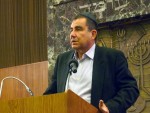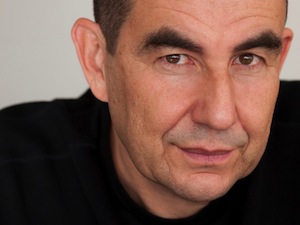Ari Shavit speaks at Winnipeg’s Shaarey Zedek Synagogue. (photo by Rebeca Kuropatwa)
As part of the Jewish Heritage Centre of Western Canada’s Annual Sol and Florence Kanee Distinguished Lecture Speaker Series, leading Israeli columnist and writer Ari Shavit addressed a packed room of 300 people on the topic Is Peace Dead? The talk took place April 19 at Shaarey Zedek Synagogue in Winnipeg.
Shavit, who described himself a “diehard peacenik,” said he is more comfortable referring to what some call “the Arab Awakening” as “the Arab Chaos.”
He explained, “We were hoping for an Arab Spring. It turned into something else and the result is the Arab Chaos. The old order that ruled over the Arab world has collapsed, but it was not replaced by any liberal democracy. It was replaced with more tribalism, more fanaticism and much more violence. We now see a human catastrophe engulfing a large part of the region and the acute situation of instability. I care about my fellow humans and we have to be saddened that we have such a terrible human catastrophe.”
Even worse, in Shavit’s view, “There is no more chance in the upcoming years to have the old kind of peace we hoped for,” he said. “I don’t think we can have the kind of peace agreement like with Egypt or Jordan in the coming years, because those were peace agreements that were signed with tyranny.”
Shavit used Syria as an example, saying that, back in the 1990s and in early 2000, he very much supported a peace agreement with Syria. But, he said, “Now, there is no one to make peace with.
“The good news is the more clear division within the Arab community. Many Arab moderates are now terrified by Iran, by ISIS, by the Islamic Brotherhood, by Al-Qaeda, by extremists, [so] they actually are closer to Israel than they ever were in the past. So, there is a kind of interesting potential within this sad, tragic, acute situation.”
According to Shavit, the road to peace today begins with the understanding that we cannot reach a two-state solution with the Palestinians in the coming months or years.
“We won’t have the comprehensive peace we hoped for,” said Shavit. “But, on the other hand, we should not accept the status quo. And, I think we should launch a two-state dynamic, which would lead to a two-state state to start with, and eventually lead to a two-state solution.”
Regionally, Shavit stressed the need for Israel to work much more closely with Egypt, Saudi Arabia, the Gulf countries and Jordan, as, he said, “They are closer to Israel than they ever were.”
Though Shavit conceded that the likelihood of signing a new formal peace agreement may not currently be in the cards, he encouraged “building a kind of peace based on economic interests, mutual interests and strategic interests.”
What Shavit envisions is “the kind of peace agreement [Israel] had with Jordan before the 1994 peace signing. There were no embassies, there were no Nobel Prizes, no White House ceremonies, but we had a very close, intimate relationship – quite a lot of the time – better than after the formal signing. That should be an example of what can be done in this new chaotic situation.”
Shavit sees potential for “cooperation as opposed to a utopian peace.” Potential partners for this cooperation, Shavit suggested would include “the major Arab Sunni nations led by moderate people…. [People who] are not deeply concerned or interested in human rights or democracy, but they don’t want extremists. Saudi Arabia and the other Gulf States fall into that category. So, the strategic game now is pretty much controlled by two non-Arab countries – Israel and Turkey – and, I would say, Egypt and Saudi Arabia.”
As to whether or not these partners are interested in just cooperation or a more lasting peace, Shavit said, “I think they want to live and they want stability. Therefore, if we promote this new peace concept, I think there’s a chance of having a better relationship. I think many of them see Israel as a partner in that.
“It’s not that they are going to have a religious conversion…. I don’t see a kind of relationship that France and Spain have or Canada and the U.S. do, but, I do see a kind of Middle East-style relationship – the ability to create a structure that can be formed again if we endorse the right ideas.”
Regarding Israel’s recent elections, Shavit feels that the left lost more than the right won. “The lack of a peace plan of action had a lot to do with that. Even the left-wing part[ies] were not very aggressive at promotional peace. The peace talked about in the national community is a kind of peace that is totally detached.”
Shavit is hopeful that Israelis will open their hearts to peace, in the case where “a kind of new peace, a concept that is more realistic, comes around. As long as the community talks about European-style peace, when we have a kind of evil political reality in a large part of the Middle East, Israelis will not buy into that.”
International support is critical to any potential peace progress and, while Shavit loves Canada in many ways, he said, “I appreciate that Canada is supportive of Israel, when there aren’t many that support Israel in such a way. [But] obviously, the real relevant player is the United States.
“I hope that America will endorse a new kind of peace policy and then build a wide coalition – first of all with Canada, then with the European powers and then with the moderate Arabs and Israelis – addressing the issues in a realistic way.”
Shavit believes that the “dysfunctional relationship” of Binyamin Netanyahu and Barack Obama is not advancing the situation. “I hope I can be successful in encouraging an intellectual process to be helpful in bringing some change to that,” he said.
Shavit, like many others in Israel and around the world, is waiting to see what kind of Israeli government will be formed. “If we do have a right-wing government, with [Avigdor] Lieberman being the centre, I worry that we will have unpleasant legislation that will alienate the Arab minority even more and jeopardize the fragile relationship with them. If it will be more moderate in the centre, there is less danger.
“I think the last six months were very troubling, with unprecedented legislation or attempts [to discriminate], though most failed. I hope and pray that our power will not go back to that kind of approach. I think it will endanger Israel’s soul in a serious way.”
Shavit is hopeful that minority rights will not be trampled, as “the tradition of the historic Israeli right always combines nationalism with liberalism, with a deep respect for democracy. I really hope we will not see dark forces in Israel rising to power.”
Rebeca Kuropatwa is a Winnipeg freelance writer.




